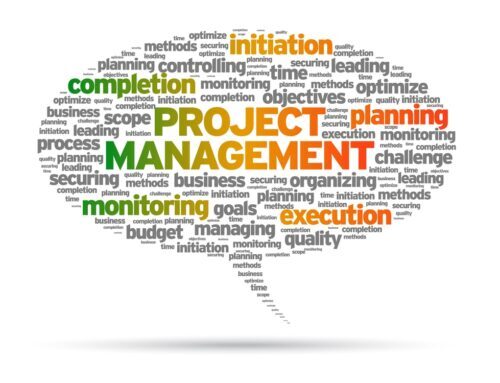As a critical determining factor in the success or failure of any professional project, project management standards and techniques evolve rapidly with the emergence of new technology and changing standards. Strong project management professionals understand that success in their field largely depends on their ability to anticipate these changes and adapt to the impact on their current and future projects. For this reason, keeping up on upcoming project management trends can help business owners ensure their hired project managers or the project management software they use offers the latest methodologies to ensure the best chance of a successful project.
How Will Project Management Look In the Next Year?
Because project management is a generalized overview of all the moving parts of a project, there are several areas that can be affected by emerging trends, each with varying impacts to project success. For the purpose of this article, we’ll focus on those that are most likely to affect the project as a whole.
Increase in Demand for Project Management Tools and Professionals
Project managers today have a much more complicated role than simply organizing and following up on all the tasks needed for a project. The position has been recognized as one of leadership, and hired professionals bring an important skill set and wealth of knowledge to the project that can’t be replicated by project management software. With this expanded leadership role, many companies are realizing that a skilled project manager brings more to the table than just the organization and tracking of project management software. Expect to see a greater demand for these professionals as SMBs recognize the rate of return on this investment.
Greater Emphasis on Soft Skills
For those working in project management, there’s likely to be a greater expectation for the less tangible soft skills. Because the project manager is considered the lead on any project team, it’s important that they are able to work well with all stakeholders and can clearly communicate expectations throughout project completion. The Project Management Institute (PMI) identifies the seven soft skills considered most critical for project managers:
- Motivation
- Leadership
- Organization
- Decision-making
- Conflict management
- Communication
- Trust-building
These skills have the greatest impact on how the project team functions, determining the level of cooperation between team members until project completion. Regardless of how well a project is planned, a team that struggles to work together or has no trust in their team lead will likely generate issues that could derail the success of the project. A project manager who displays these soft skills has the best chance of success by keeping the team moving in a positive direction, reducing conflict distractions and ensuring every aspect of the project has been mapped out and clearly communicated.
Increasingly Complex Technology Integration
As the Internet of Things (IoT) continues to expand, there will be continued growth in communication between project management professionals and the software and smart devices that provide them with access to the information they need. Artificial Intelligence (AI) is evolving to assist project managers with gathering information, data analysis and using that data to improve project delivery. These improved processes can better assist with multiple areas of complex projects, such as risk management, resource management and real-time analysis of a project’s evolving projected outcome. A report generated by the PMI identifies six technologies thought to have the greatest upcoming impact on the future of project management:
Machine learning: The process of computers learning how to respond in a human way through the analysis of data using computational methods. - Deep learning: A subset of machine learning where data is analyzed by multilayered neural networks inspired by the workings of a human brain.
- Robotic process automation (RPA): Workhorse software designed to handle basic, repetitive tasks within applications, reducing the man-hours needed to complete them.
- Decision management: The use of AI to analyze data and generate possible options and outcomes based on computational logic.
- Knowledge-based systems: A computer program that extracts data from a knowledge base and uses its inference engine to generate solutions to complex problems.
- Expert systems: One of the earliest forms of AI using knowledge-based architecture. A computer system programmed to mimic the decision-making skills of a human expert.
As these technologies continue to improve, project managers will find themselves with more sophisticated tools to assist them in meeting their deadlines, budget limits and communication goals.
Enhanced Collaboration
Even the most sophisticated technology is limited in impact unless paired with human collaboration. With a global pandemic changing the collaborative scene for many businesses, it’s likely that necessary temporary solutions, such as the implementation of remote work opportunities when possible, will find their way into the permanent collaborative structure once the threat has passed. Already, the need for technology-based solutions has highlighted areas that are inadequate, requiring the use of multiple software and technologies to bridge the gaps. This will lead to the development of more comprehensive project management collaboration tools to improve workflow and keep project managers in contact with project stakeholders in this new business environment.
Continued Focus on Agile Methodologies
Today’s project manager oversees increasingly complex projects and is expected to adjust their approach as needed to ensure the project moves forward and meets target goals. This, combined with the increased expectation of customer input, will continue to be the case moving forward into 2022, so expect more implementation of agile project management methodologies to enhance the simpler waterfall system. This is known as a hybrid management approach and utilizes the benefits of both management techniques as needed, giving businesses blended results that can be tailored to meet the demands of the current project. This can be especially beneficial for time-focused projects that could benefit from scrum management but are perhaps handled by teams already familiar with waterfall methodologies. Using the hybrid approach will allow project teams the comfort of standard management techniques while increasing flexibility and response time to sudden changes.
About the Author: EIRE Systems
EIRE Systems is a leading independent provider of professional IT, AV and Access Security services to the financial, insurance, manufacturing, health care, retail, construction, hospitality, commercial real estate, legal, educational and multinational sectors in Japan and throughout the Asia Pacific region. EIRE Systems has expertise across a wide spectrum of Information Technologies, with a track record for successfully completing hundreds of assignments since its establishment in 1996.



